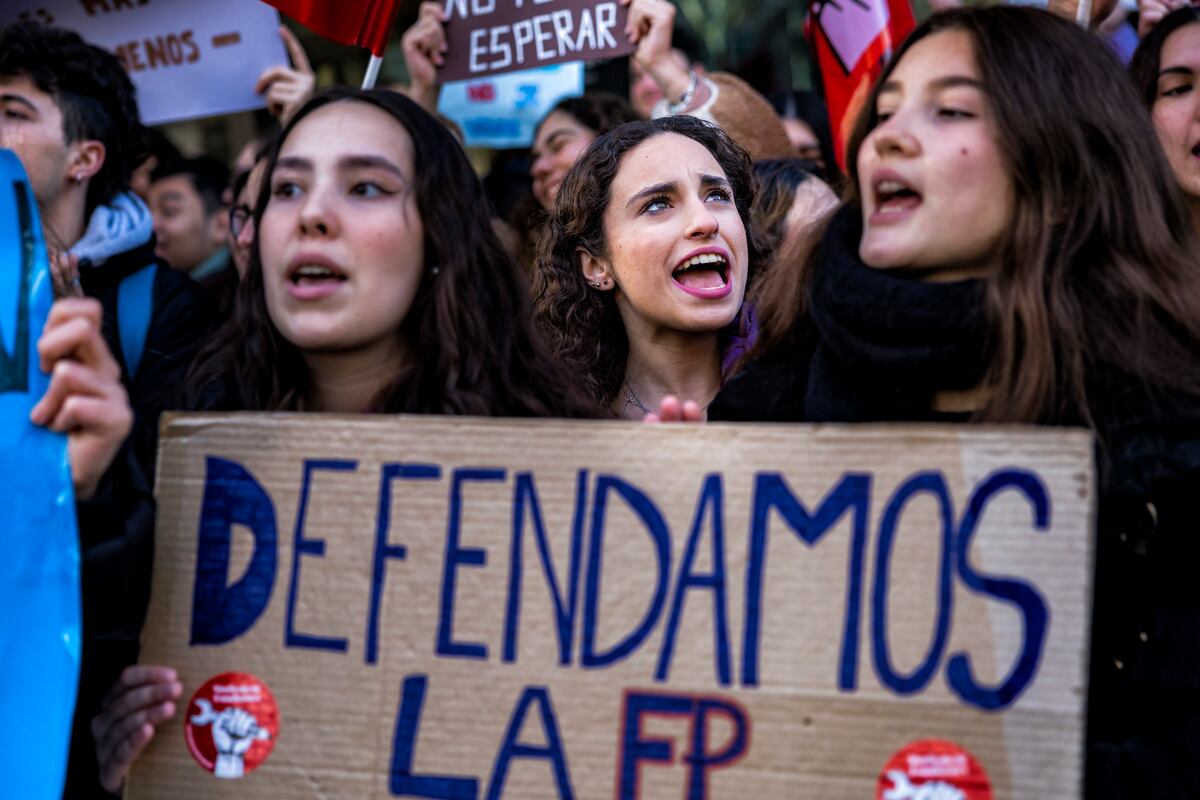
For another year in the Madrid region, the number of students who have been denied a public place to pursue their vocational degrees is confronting the trade union committee Obreras and the local government, which produced a report summarizing the data five years ago. The union’s latest research shows 62,191 young people are unable to get a place, a new record. More than 20% of students were left behind in 2023-2024, and that number rose to about 29% in 2024-2025. The Madrid executive once again denied the information provided by the union on the grounds that it “did not come from any official source” and asserted that, in fact, the course had more than 5,000 vacancies in all grades, even after the temporary registration period that began during October.
But experiences like that of Lucas Buga, a 20-year-old from Madrid, show that being left behind is a very serious problem for young people. “I’ve been trying to get vocational training opportunities for three years, signing up for all sorts of specialties, from aged care to video,” he says. He didn’t have much luck, so he followed the path many people in his situation take: doing whatever comes to mind, which in his case was cleaning. “It is very noticeable that this situation is getting worse every year,” declares Buga, who is also a member of the Madrid Student Union.
According to official data from the city of Madrid, this year the number of FP students exceeded 188,500, an increase of 10,000 compared to last year, and this figure includes both students enrolled in public and private education. An assessment carried out by CC OO analyzing data on basic, intermediate and advanced vocational training shows that demand is increasing year on year due to the employability of students who complete this type of training, but supply remains significantly below. Moreover, the gap continues to widen every year.
“The provision of public vocational training in Madrid does not respond to the real demands of students and the needs of the labor market,” criticizes CCOO Madrid’s Education Secretary Aida San Milan. He agrees with the regional administration that there are still vacancies, but this happens because “the ministry does not plan and coordinate recruitment, perpetuates a model that wastes resources and does not direct training towards the real needs of the Madrid economy.”
A government spokesperson said the 5,000 vacancies included “high-demand, high-employability occupations” such as automotive repair and building renovation and maintenance (entry level), telecommunications equipment and food marketing (intermediate level), and web application development and industrial automation and robotics (advanced level). It added that the department “continues to work to tailor the training offer of these studies to both the most in-demand profiles in the labor market and to different parts of the region, with the aim of allowing students to study in their preferred cycles without extensive travel.”
On the contrary, CC OO points out that the worst situation is in the Intermediate FP, where 70% of students fail, with around 26,021 students. The specialties with the highest number of application rejections were guiding and free time in natural environments (89%), networks and water treatment stations (90%), video disc jockeys and sound (86%), health emergencies (82%), and assembly and installation of structures of aviation systems (94%).
This is followed by high levels of FP, with 69% of young people, or 34,485 people, being displaced. Imaging for diagnostics and nuclear medicine was the specialty with the worst data, with 94% of hospitalizations, an increase of 15% from the previous year. This excludes early childhood education by 78% (6% more than in 2024) and 3D animation, games and interactive environments by 77%, making it a “clearly inadequate offer”.
Thirty-six percent of those pursuing a basic FP degree also fail to achieve it. There are 1,685 young people who do not have access to public spaces to continue their studies. In this case, incidents mainly occur in specialized areas such as sports facility access and protection (38%), commercial services (34%), or electrical and electronics (35%).
I don’t have a place or a job
For unions, that means not only is demand significantly lower, but groups in various specialties are also closed, meaning fewer places. “The public network increased from 1,791 groups to 1,733 groups, a decrease of nearly 3.5%, which contrasts with a sustained increase in the number of students applying for places,” they complain. “This decline is far from punctual and is repeated year after year, while local governments have actually announced the creation of concentrated locations in private centres, leaving thousands of young people aspiring to train in their future professions without opportunities.”
And that’s one of the big dilemmas. Another CC OO report from last summer showed that almost 50% of students enrolled in FP were privately educated, and noted that this was linked to the fact that in certain specializations, such as health, computing, communications, and training for all physical and sporting activities, the biggest offer was private education. The services provided at these centers increase depending on the level of education. Higher degrees provide greater employability and access to better working conditions, but families with lower incomes are less likely to take up these types of jobs due to the strong presence of the private sector.
“Those with better economic potential enroll in private education, while those with less financial means are forced to abandon their studies, a failure of the system that deepens inequality and reduces opportunities for training and employment,” the CC OO concludes. Professor Buga points out that private centers are “never the first choice” for the majority of students, as the fees are too high, although he admits that the materials and learning conditions in these types of centers are much better than in public centers, where students often have no possibility of completing their training because they “share the same computer” or there is no place for a professional internship.
“These are all about the very conscious retrenchment policies that Ayuso is implementing,” Buga said, pointing out the inaction by the Ministry of Education on an issue that has such a huge impact on the future of young people. “What they want to do in Madrid is to erase the word ‘public’ from the FP, just like what is being done for universities.”



